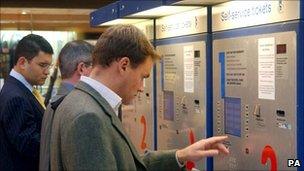Spending cuts spark fears of 8% rise in rail fares
- Published

Train operators said the suggested rises were currently just speculation
Rail fares may rise by up to 8% next year if the Department for Transport (DfT) is hit hard in the government's spending review, sources have said.
While many rail fare rises are currently capped at inflation plus 1%, the department could change that to inflation plus 2% or 3% in the autumn.
Increases are based on July's RPI measure, expected to be 5%, which could mean increases of up to 8%.
Consumer watchdog Passenger Focus urged train operators to show restraint.
'Just speculation'
Transport Secretary Philip Hammond said: "It would normally be the case that next year's regulated train fares are calculated using July's inflation figure, plus 1%.
"But this is not a normal year. The scale of the financial crisis that we have inherited means that we will have to make some tough decisions in the spending review which concludes this autumn.
"I am therefore not yet in a position to determine next year's fare increase.
"It would be irresponsible, at a time when investment in the railway is under pressure, to rule anything out until the spending review is concluded."
A spokesman for the Association of Train Operating Companies said predictions of rail fare rises were "just speculation".
'Cattle trucks'
Gerry Doherty, leader of the TSSA transport union, said the Liberal Democrats must stick to a manifesto commitment to change the annual fare price rise formula to RPI minus 1%.
Mr Doherty said that "to do anything else would be to betray rail users" who voted for the party.
Bob Crow, general secretary of the RMT, said the government was protecting rail companies from the cuts by allowing fares to "shoot through the roof".
"Private rail profits will be ring-fenced while the travelling public are forced to pay through the nose to travel on overcrowded cattle trucks on dangerously under-maintained tracks," he said.
Alexandra Woodsworth of the Campaign for Better Transport said: "Particularly now, with high fuel prices, we need to make sure the train gives people a real alternative to driving".
- Published8 July 2010
- Published22 June 2010